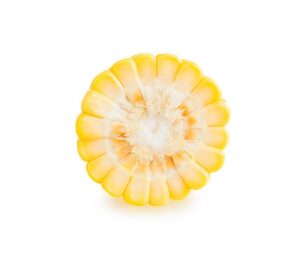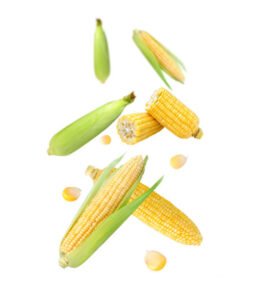Sweet corn benefits are more than just its delicious taste. Scientifically known as Zea mays var. saccharata, this vibrant and flavorful summer staple offers a range of health benefits. In this article, we will explore the scientific evidence behind the nutritional value and potential health benefits of sweet corn.
Antioxidant-rich Properties
Sweet corn contains various antioxidants, including lutein, zeaxanthin, and ferulic acid. These compounds have been associated with reduced risk of chronic diseases, such as cardiovascular disease and age-related macular degeneration.
Lutein and zeaxanthin, for instance, are carotenoids that play a crucial role in maintaining eye health by filtering harmful high-energy blue wavelengths of light and protecting against oxidative damage in the retina. The presence of these carotenoids in sweet corn contributes significantly to its vision-protective properties.
Additionally, ferulic acid, another potent antioxidant found in sweet corn, exhibits anti-inflammatory and neuroprotective effects, which may aid in reducing the risk of neurodegenerative diseases like Alzheimer’s and Parkinson’s. This distinct blend of antioxidants in sweet corn sets it apart as a valuable addition to a balanced diet for promoting overall health and well-being.
 Digestive Health
Digestive Health
The fiber content in sweet corn promotes healthy digestion by supporting regular bowel movements and preventing constipation. Additionally, it may help maintain a healthy gut microbiome, contributing to optimal digestive function.
Moreover, sweet corn contains a specific type of fiber known as soluble fiber, which forms a gel-like substance in the digestive tract. This gel helps slow down digestion, allowing for better absorption of nutrients and promoting a feeling of fullness. By regulating the pace of digestion, sweet corn can also help stabilize blood sugar levels, which is beneficial for overall health, especially for individuals managing diabetes or insulin resistance.
Furthermore, sweet corn is rich in antioxidants such as lutein and zeaxanthin, which are not only beneficial for eye health but also play a role in supporting digestive health. These antioxidants help reduce inflammation in the digestive tract, which can alleviate symptoms of conditions like irritable bowel syndrome (IBS) and inflammatory bowel disease (IBD). Additionally, the vitamins and minerals present in sweet corn, such as vitamin C, magnesium, and potassium, contribute to the overall health of the digestive system by supporting the function of enzymes and muscles involved in digestion and nutrient absorption.
 Eye Health
Eye Health
The presence of lutein and zeaxanthin in sweet corn is beneficial for eye health. These carotenoids have been linked to a reduced risk of cataracts and age-related macular degeneration, which are common eye conditions.
In addition to lutein and zeaxanthin, sweet corn is also rich in other essential nutrients that contribute to eye health. Vitamin C, for instance, plays a crucial role in maintaining the health of the blood vessels in the eyes and reducing the risk of developing conditions like glaucoma. Moreover, the presence of beta-carotene in sweet corn supports the production of vitamin A, which is essential for good vision, particularly in low-light conditions.
Furthermore, the high fiber content in sweet corn promotes overall eye health indirectly by aiding in the regulation of blood sugar levels. Fluctuations in blood sugar can lead to diabetic retinopathy, a condition that affects the blood vessels in the retina, potentially causing vision loss. By helping to stabilize blood sugar levels, sweet corn can contribute to the prevention of diabetic retinopathy and other related eye complications.
 Heart Health
Heart Health
The combination of fiber, vitamins, and minerals found in sweet corn contributes to heart health. Dietary fiber helps lower cholesterol levels, while potassium supports healthy blood pressure levels. These factors are essential for maintaining a healthy cardiovascular system.
Sweet corn, with its rich content of antioxidants such as lutein and zeaxanthin, offers unique benefits for heart health. These antioxidants play a crucial role in reducing the risk of cardiovascular diseases by preventing the oxidation of LDL cholesterol, a major contributor to arterial plaque buildup. Furthermore, the presence of folate in sweet corn aids in regulating homocysteine levels in the blood, which, when elevated, can increase the risk of heart disease and stroke.
Moreover, sweet corn contains significant amounts of phytochemicals like ferulic acid, which have been linked to improved arterial function and reduced inflammation in the cardiovascular system. This natural compound helps relax blood vessels, promoting better blood flow and reducing the strain on the heart. Additionally, the high fiber content in sweet corn supports healthy digestion and weight management, indirectly benefiting heart health by lowering the risk factors associated with obesity, such as high blood pressure and cholesterol levels. Overall, incorporating sweet corn into a balanced diet can be a delicious way to nourish the heart and promote long-term cardiovascular well-being.
 Energy Boost
Energy Boost
Sweet corn is a good source of complex carbohydrates, providing a sustained release of energy. It can be a valuable addition to a balanced diet, particularly for individuals engaged in physical activities or seeking a natural energy boost.
Moreover, sweet corn is rich in fiber, which aids in digestion and helps maintain stable blood sugar levels. This is crucial for sustaining energy levels throughout the day, as it prevents the sudden spikes and crashes often associated with refined sugars. Additionally, the natural sugars present in sweet corn, such as sucrose and glucose, provide a quick source of energy without the drawbacks of processed snacks or drinks.
Furthermore, sweet corn contains an array of essential vitamins and minerals, including vitamin B complex, which plays a vital role in converting carbohydrates into energy. Specifically, vitamin B1 (thiamine), B3 (niacin), and B6 (pyridoxine) are abundant in sweet corn, contributing to efficient energy metabolism. Alongside these vitamins, sweet corn also boasts minerals like magnesium and potassium, which support muscle function and hydration, further enhancing its effectiveness as a natural energy booster.
 Weight Management
Weight Management
Sweet corn can be a valuable addition to a weight management plan. Its high fiber content helps promote feelings of fullness and satiety, which can aid in portion control and reduce overeating. Additionally, sweet corn is a low-calorie and nutrient-dense food, making it a satisfying choice for weight-conscious individuals.
Furthermore, sweet corn is a good source of complex carbohydrates, which are essential for providing sustained energy levels throughout the day. Unlike simple carbohydrates found in processed foods, complex carbohydrates in sweet corn are digested more slowly, preventing rapid spikes in blood sugar levels that can lead to cravings and overeating.
Moreover, sweet corn contains negligible amounts of fat and cholesterol, making it an ideal addition to a low-fat diet aimed at weight management. Its natural sweetness can also satisfy cravings for sugary snacks, reducing the likelihood of indulging in high-calorie treats. Incorporating sweet corn into meals can provide a satisfying and nutritious option for individuals seeking to maintain a healthy weight.
Skin Health
The vitamins and antioxidants present in sweet corn, such as vitamin C and beta-carotene, contribute to maintaining healthy skin. These nutrients play a role in collagen synthesis, which supports skin elasticity and helps protect against skin damage caused by environmental factors.
Furthermore, sweet corn contains a significant amount of lutein and zeaxanthin, two powerful antioxidants that are particularly beneficial for skin health. These compounds help protect the skin from harmful UV rays, reducing the risk of sun damage and premature aging. Additionally, sweet corn is rich in water content, which helps hydrate the skin and maintain its natural moisture barrier.
Moreover, the high fiber content in sweet corn aids in the body’s detoxification process, promoting clear and radiant skin. By supporting digestive health, sweet corn ensures efficient elimination of toxins from the body, preventing skin issues like acne and blemishes.
Blood Sugar Regulation
Contrary to popular belief, sweet corn can be enjoyed by individuals with diabetes or those aiming to manage their blood sugar levels. When consumed in moderation as part of a balanced meal, the fiber and complex carbohydrates in sweet corn can help regulate blood sugar levels and provide sustained energy.
Moreover, sweet corn contains a moderate glycemic index (GI) value, which means it doesn’t cause sharp spikes in blood sugar levels when consumed. This is particularly advantageous for individuals with diabetes or those aiming for stable blood glucose levels. The combination of fiber and complex carbohydrates in sweet corn allows for slower digestion and absorption of sugars into the bloodstream, promoting more controlled fluctuations in blood sugar levels throughout the day.
Additionally, the presence of certain antioxidants and phytochemicals in sweet corn, such as lutein and zeaxanthin, may also contribute to its blood sugar regulatory effects. These compounds have been associated with improved insulin sensitivity, which can enhance the body’s ability to utilize glucose effectively. Including sweet corn as part of a diverse and balanced diet can offer not only its blood sugar regulatory benefits but also a variety of other nutrients essential for overall health and well-being.
Cancer Prevention
Sweet corn contains certain compounds, including ferulic acid and anthocyanins, which have shown potential anticancer properties. These compounds possess antioxidant and anti-inflammatory effects that may help reduce the risk of certain types of cancer.
Sweet corn, distinguished by its vibrant yellow kernels and succulent taste, also contains lutein and zeaxanthin, carotenoids renowned for their role in eye health. However, recent research has unveiled their additional function in cancer prevention. These compounds demonstrate potent antioxidant activity, scavenging harmful free radicals and thwarting oxidative stress, a hallmark of cancer development.
Moreover, sweet corn’s high fiber content aids in maintaining optimal gut health, crucial for the prevention of colorectal cancer. Fiber promotes regular bowel movements, facilitating the elimination of potential carcinogens and reducing their contact time with the intestinal lining.
Furthermore, sweet corn stands out among other vegetables due to its unique combination of bioactive compounds, including polyphenols and beta-carotene. These constituents work synergistically to combat cancer initiation and progression by inhibiting tumor cell proliferation and inducing programmed cell death (apoptosis). Studies suggest that regular consumption of sweet corn, as part of a balanced diet, may confer significant protection against various malignancies, underscoring its potential as a valuable addition to cancer prevention strategies.
Bone Health
The minerals present in sweet corn, such as magnesium and phosphorus, play a crucial role in maintaining strong and healthy bones. These minerals contribute to bone mineral density and help prevent conditions like osteoporosis.
Furthermore, sweet corn contains significant amounts of vitamin K, which is essential for bone health as it aids in the modification of osteocalcin, a protein involved in bone mineralization. Vitamin K helps ensure that calcium is properly utilized in bones, promoting their strength and resilience. Additionally, sweet corn is a good source of antioxidants like zeaxanthin and lutein, which have been linked to reducing the risk of age-related bone degeneration and maintaining overall bone integrity.
Moreover, the fiber content in sweet corn supports digestive health, indirectly benefiting bone health. A healthy digestive system aids in the absorption of nutrients, including those crucial for bone strength, such as calcium, magnesium, and phosphorus. By promoting efficient nutrient absorption, sweet corn contributes to the overall well-being of bones and helps maintain optimal bone density.
Immune System Support
Sweet corn contains a significant amount of vitamin C, a powerful antioxidant that plays a crucial role in supporting the immune system. Vitamin C enhances the function of various immune cells, including white blood cells, which are responsible for fighting off infections and illnesses.
In addition to vitamin C, sweet corn is rich in other antioxidants such as lutein and zeaxanthin. These compounds help combat oxidative stress in the body by neutralizing harmful free radicals. By reducing oxidative stress, sweet corn supports overall immune function and helps prevent cellular damage that can weaken the immune response.
Sweet corn is a good source of dietary fiber, which plays a vital role in supporting a healthy gut microbiome. A diverse and balanced gut microbiota is essential for a strong immune system, as it helps regulate immune responses and promotes the production of beneficial compounds like short-chain fatty acids.
The nutritional values for 100 grams of Sweet Corn
- Calories: Around 86 kcal
- Water: Approximately 73 grams
- Protein: About 3.3 grams
- Carbohydrates: Roughly 19 grams
- Dietary Fiber: Around 2.7 grams
- Sugars: Approximately 6.3 grams
- Fat: About 1.2 grams
- Saturated Fat: Approximately 0.2 grams
- Monounsaturated Fat: Around 0.4 grams
- Polyunsaturated Fat: Approximately 0.5 grams
- Vitamins and Minerals:
- Vitamin A: Around 9 micrograms
- Vitamin C: Approximately 6.3 milligrams
- Vitamin K: Around 0.3 micrograms
- Thiamine (B1): Approximately 0.2 milligrams
- Riboflavin (B2): Around 0.1 milligrams
- Niacin (B3): Approximately 1.7 milligrams
- Vitamin B6: Around 0.1 milligrams
- Folate (B9): Approximately 19 micrograms
- Pantothenic Acid (B5): Around 0.6 milligrams
- Choline: Approximately 12.3 milligrams
- Calcium: Around 2 milligrams
- Iron: Approximately 0.5 milligrams
- Magnesium: Around 37 milligrams
- Phosphorus: Approximately 89 milligrams
- Potassium: Around 270 milligrams
- Sodium: Approximately 15 milligrams
- Zinc: Around 0.5 milligrams
- Manganese: Approximately 0.2 milligrams
- Copper: Around 0.1 milligrams
- Selenium: Approximately 0.6 micrograms
Please note that these values are approximate and can vary slightly depending on the specific variety and preparation of the sweet corn.
Conclusion
Sweet corn is not only a delicious summer treat but also a nutritious addition to your diet. Its abundance of vitamins, minerals, and antioxidants offers numerous health benefits, including improved digestion, enhanced eye health, and support for heart health. Incorporating sweet corn into your meals can be a flavorful way to enjoy its many advantages.
Remember to consult with a healthcare professional or nutritionist to determine the best way to incorporate sweet corn into your diet based on your individual health needs and preferences.
 If you’re in search of a delicious sweet corn recipe, you’ve come to the right place! This recipe brings together the natural sweetness and crunch of fresh corn with a medley of colorful vegetables, creating a delightful and refreshing salad. Bursting with flavor and nutritional goodness, this corn-infused dish is a perfect addition to your summer menu. Let’s dive into the easy-to-follow steps of this vibrant Double Corn Salad recipe and savor the essence of seasonal ingredients.
If you’re in search of a delicious sweet corn recipe, you’ve come to the right place! This recipe brings together the natural sweetness and crunch of fresh corn with a medley of colorful vegetables, creating a delightful and refreshing salad. Bursting with flavor and nutritional goodness, this corn-infused dish is a perfect addition to your summer menu. Let’s dive into the easy-to-follow steps of this vibrant Double Corn Salad recipe and savor the essence of seasonal ingredients.
Contraindications
While sweet corn is generally safe for consumption, there are a few considerations to keep in mind:
Allergies:
Some individuals may have an allergic reaction to corn or specific components present in sweet corn. If you have a known allergy to corn or related ingredients, it is best to avoid consuming sweet corn.
Digestive Sensitivity:
Sweet corn contains a type of carbohydrate called cellulose, which may be difficult for some individuals to digest. If you experience digestive discomfort or bloating after consuming sweet corn, you may have a sensitivity to this carbohydrate.
Blood Sugar Management:
Sweet corn contains natural sugars, and individuals with diabetes or those monitoring their blood sugar levels should consume it in moderation. It is important to account for the carbohydrate content of sweet corn in your overall meal plan.
Genetically Modified Organisms (GMOs):
It is worth noting that a significant portion of commercially available sweet corn is genetically modified. If you prefer to avoid GMOs, consider purchasing organic or non-GMO certified sweet corn.
As with any dietary considerations, it is recommended to consult with a healthcare professional or registered dietitian for personalized advice, especially if you have specific health conditions or concerns.
Fascinating Facts About Sweet Corn
Popping Phenomenon:
Did you know that some varieties of sweet corn have kernels that can be popped like popcorn? While not as common as traditional popcorn, certain types of sweet corn contain kernels with a higher moisture content and a thinner hull, making them suitable for popping. This unique characteristic adds a fun twist to snack time and showcases the versatility of sweet corn beyond traditional uses.
Phenotypic Plasticity:
Sweet corn exhibits a fascinating phenomenon known as phenotypic plasticity, where its physical traits can be influenced by environmental factors. For example, sweet corn plants grown at higher altitudes or in cooler climates may produce smaller ears with fewer kernels, while those grown in warmer regions might yield larger, fuller ears. This adaptability highlights sweet corn’s ability to thrive in a wide range of conditions.
Colorful Corn:
While yellow and white are the most common colors associated with sweet corn, there are varieties that come in an array of vibrant hues, including purple, red, and even black! These colorful varieties, often referred to as “ornamental corn” or “Indian corn,” are primarily used for decorative purposes, such as autumnal decorations and ornamental displays. However, they are still edible and offer a visually striking addition to culinary creations.
Corn Silk Tea:
In some cultures, the silky threads that protrude from the top of sweet corn ears, known as corn silk, are harvested and brewed into a soothing tea with purported health benefits. Corn silk tea is believed to have diuretic properties and is traditionally used to promote kidney and urinary tract health. While its taste may be subtle, its potential health benefits make it a noteworthy aspect of sweet corn’s cultural significance.
Corn Mazes:
Sweet corn isn’t just for eating—it’s also a popular attraction in the form of corn mazes! These intricate mazes, carved into fields of towering sweet corn stalks, offer entertainment for families and adventurers alike. Visitors navigate through winding pathways and dead ends, testing their navigational skills while enjoying the natural beauty of the cornfields. Corn mazes have become a beloved autumn tradition in many communities, showcasing the playful side of sweet corn beyond its culinary uses.
Sound Sensitivity:
Sweet corn plants have been found to exhibit sensitivity to sound vibrations, particularly in the range of 220 Hz to 680 Hz. Research suggests that these vibrations can influence the growth and development of sweet corn, leading to speculation about the potential use of sound therapy in agricultural practices to enhance crop yield and quality.
Phenolic Compounds:
Sweet corn contains a variety of phenolic compounds, including ferulic acid and caffeic acid, which contribute to its antioxidant properties. However, what’s lesser-known is that these compounds also play a role in protecting the plant from environmental stressors such as UV radiation and pest attacks. As a result, sweet corn possesses built-in defense mechanisms that contribute to its resilience and vitality.
Symbiotic Relationships:
Sweet corn has been found to engage in symbiotic relationships with certain beneficial microorganisms in the soil, particularly mycorrhizal fungi. These fungi form mutually beneficial associations with sweet corn roots, facilitating the uptake of water and nutrients in exchange for carbohydrates produced by the plant through photosynthesis. This symbiosis enhances the plant’s overall health and productivity, underscoring the intricate web of relationships within the soil ecosystem.
Cultural Significance:
In some indigenous cultures, sweet corn holds deep spiritual and cultural significance beyond its culinary value. For example, among certain Native American tribes, sweet corn is considered a sacred crop with ceremonial importance. Rituals involving the planting, harvesting, and consumption of sweet corn are performed to honor ancestral traditions and express gratitude for the bounty of the land.
Bioaccumulation Potential:
Sweet corn has been found to possess the ability to bioaccumulate certain heavy metals from the soil, including cadmium and lead. While sweet corn itself is not typically a significant source of heavy metal exposure for humans, this characteristic underscores the importance of soil health and management practices in agricultural settings to minimize the accumulation of contaminants in food crops.
Sweet Corn Sculptures:
In addition to being enjoyed as a culinary delight, sweet corn has also inspired the creation of intricate sculptures and artworks. Talented artists and sculptors have utilized sweet corn husks, kernels, and cobs as mediums for their creative expressions, showcasing the versatility of this humble vegetable beyond its traditional uses. From elaborate corn husk dolls to intricate corn husk weavings, these artworks celebrate sweet corn’s cultural and artistic significance.
To explore more plants, please visit our page about plants
References
- Martinez C, et al. Health benefits and bioactive compounds of maize. Food Science and Technology International. 2017;23(7):567-580.
- Slavin JL, Lloyd B. Health Benefits of Fruits and Vegetables. Advances in Nutrition. 2012;3(4):506-516.
- Wang J, et al. Carotenoids from corn: Composition and bioavailability. Comprehensive Reviews in Food Science and Food Safety. 2018;17(4):1154-1183.
- USDA FoodData Central. National Nutrient Database for Standard Reference.
- Martinez C, et al. Health benefits and bioactive compounds of maize. Food Science and Technology International. 2017;23(7):567-580.
- Slavin JL, Lloyd B. Health Benefits of Fruits and Vegetables. Advances in Nutrition. 2012;3(4):506-516.
- Wang J, et al. Carotenoids from corn: Composition and bioavailability. Comprehensive Reviews in Food Science and Food Safety. 2018;17(4):1154-1183.
- Han Y, et al. The Chemical and Biological Properties of Anthocyanins. Food Chemistry. 2019;288:5-20.
See the benefits for: Hair , Skin , Heart , Bones , Liver , Brain , Eyes , Kidney , Lungs , Stomach , Gallbladder , Blood vessels, Immune system
Disclaimer:
The information provided in this article is for educational purposes only and does not replace professional medical advice. Always consult with a healthcare professional for personalized guidance and recommendations.

 Digestive Health
Digestive Health Eye Health
Eye Health Heart Health
Heart Health Energy Boost
Energy Boost Weight Management
Weight Management